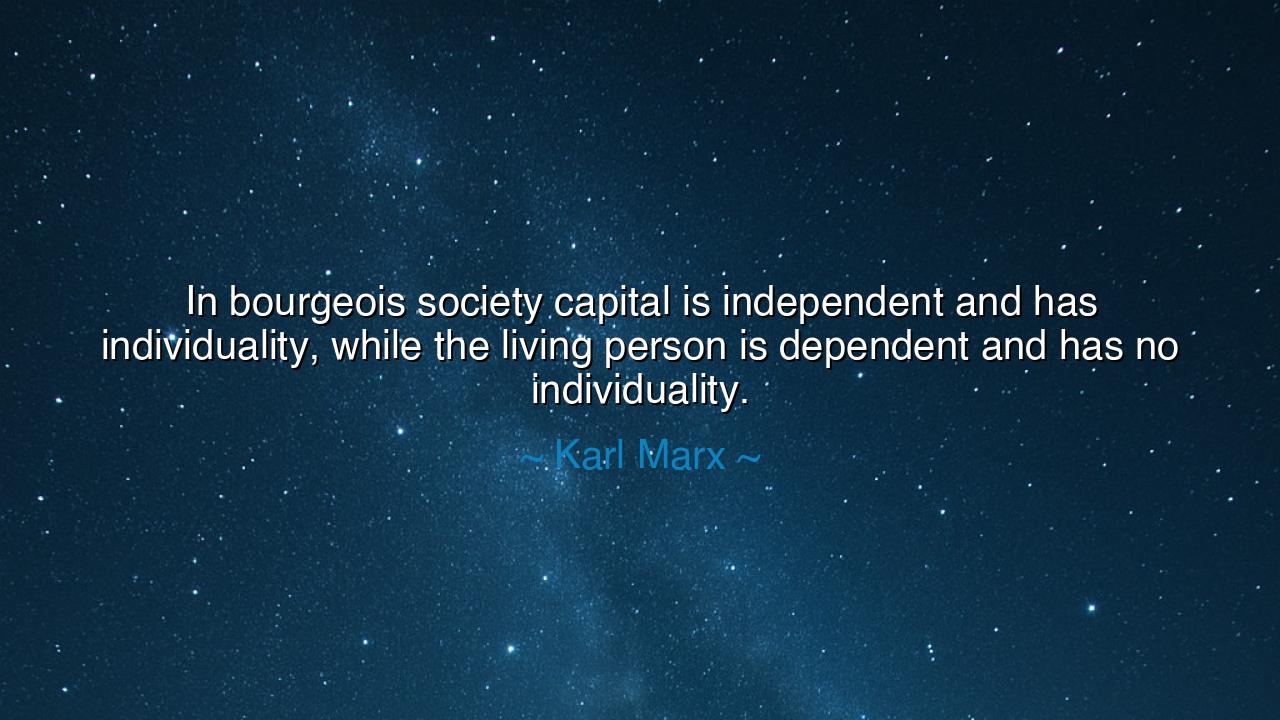
In bourgeois society capital is independent and has
In bourgeois society capital is independent and has individuality, while the living person is dependent and has no individuality.






Hear the thunderous words of Karl Marx, who saw through the glitter of wealth to the hidden chains of humanity: “In bourgeois society capital is independent and has individuality, while the living person is dependent and has no individuality.” This is no idle phrase, but a cry against the inversion of life’s natural order. For in a world governed by money, the inanimate gains power while the human spirit is bent and broken, stripped of its freedom and dignity. Marx declares that in such a society, it is not the person who lives, but capital itself that takes on life.
The meaning of this truth is piercing. In bourgeois society, the merchant, the banker, the industrialist, and all who bow before profit have built a system where the coin is king and the worker its servant. Capital—the lifeless accumulation of wealth—moves freely, grows endlessly, and shapes the destiny of nations. Meanwhile, the actual human being, with heart and soul, is bound by dependence: dependent on wages, dependent on the favor of employers, dependent on the very system that consumes their time, their labor, their very being. In such a world, the human loses individuality, becoming faceless, a number, a mere instrument for the growth of wealth.
The ancients spoke in their own way of this same peril. In Rome, the dignity of the citizen was slowly eroded as wealth concentrated in the hands of the few. Landless peasants crowded into the cities, dependent on bread and circuses, while senators grew fat on estates tilled by slaves. Rome, once proud of its citizens’ individuality, became a place where only capital—gold, estates, influence—mattered. The person became shadow, while wealth became substance. Thus history proves Marx’s warning: when riches are treated as living beings, the living are reduced to things.
Consider the Industrial Revolution. The factory rose as the new temple of capital, with its machines grinding day and night. Children were sent to crawl under looms, men worked until their bodies broke, women labored without rest. Their names were forgotten; their faces blurred into the mass of the working class. Yet the mill itself, the machines, the profits—these were remembered, celebrated, protected by law. Here, capital had individuality, moving and shaping society, while the human person was stripped of identity, existing only as fuel for the machine.
Marx’s words strike with such power because they expose the illusion of freedom in bourgeois society. The wealthy declare that every person is free, yet this freedom is hollow when survival depends on submitting to the rule of capital. The worker cannot choose not to labor, the poor cannot choose not to serve, and the dependent cannot choose individuality when their very life is bound in chains of necessity. Thus the individuality of the human is lost, while the abstraction of money and property is exalted as if it were alive.
The lesson is clear: a society that values capital above people is a society in decay. The measure of a civilization is not in how much wealth it accumulates, but in how much dignity it grants to each person. When wealth rules, cruelty follows; when people rule, justice may flourish. To restore balance, we must remember that capital is lifeless—it exists only to serve humanity, not to enslave it. The true purpose of labor, of community, of creation, is to uplift the individual, not to erase them.
What, then, must we do? Resist the worship of money. Build institutions where people matter more than profit, where workers are honored as creators, not treated as tools. See through the false individuality of capital and reclaim the true individuality of the living. Teach children that their worth lies not in wealth but in character, not in possessions but in the uniqueness of their soul. For only when the person is valued above the coin can society walk free, unchained, toward its higher destiny.
Thus remember: capital is not alive, yet it is treated as master; the person is alive, yet too often treated as slave. Marx’s words call us to reverse this injustice, to break the chains of dependence, and to restore individuality to the human spirit. For only then shall a civilization stand, not on the lifeless idol of wealth, but on the living strength of its people.






AAdministratorAdministrator
Welcome, honored guests. Please leave a comment, we will respond soon